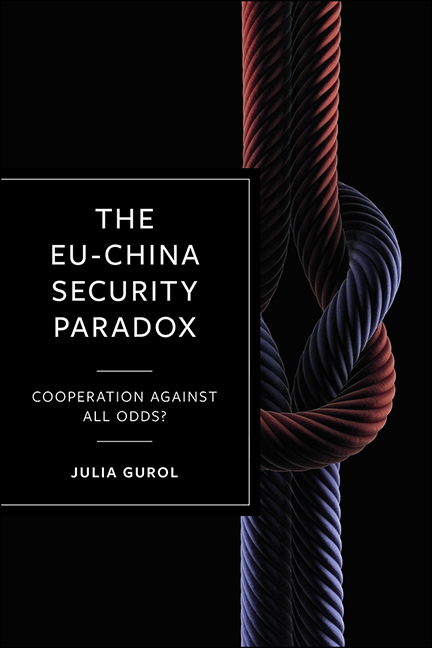Book contents
- Frontmatter
- Contents
- List of Figures
- List of Tables
- List of Abbreviations
- About the Author
- Acknowledgements
- 1 The EU and China in a Changing International Environment
- 2 Analytical Framework: Towards Multidimensionality
- 3 The EU’s and China’s Foreign and Security Policy Principles
- 4 The EU and China on the Global Stage: Interests and Interdependence
- 5 Framing and Perceptions in EU–China Security Relations
- 6 EU–China Relations on Anti-Terrorism
- 7 EU–China Relations on Maritime Security and Anti-Piracy
- 8 EU–China Relations on Climate and Energy Security
- 9 The US: An Elephant in the Room for EU–China Security Relations
- 10 Conclusion and Outlook: The EU and China at a Crossroads
- Notes
- References
- Index
3 - The EU’s and China’s Foreign and Security Policy Principles
Published online by Cambridge University Press: 15 September 2022
- Frontmatter
- Contents
- List of Figures
- List of Tables
- List of Abbreviations
- About the Author
- Acknowledgements
- 1 The EU and China in a Changing International Environment
- 2 Analytical Framework: Towards Multidimensionality
- 3 The EU’s and China’s Foreign and Security Policy Principles
- 4 The EU and China on the Global Stage: Interests and Interdependence
- 5 Framing and Perceptions in EU–China Security Relations
- 6 EU–China Relations on Anti-Terrorism
- 7 EU–China Relations on Maritime Security and Anti-Piracy
- 8 EU–China Relations on Climate and Energy Security
- 9 The US: An Elephant in the Room for EU–China Security Relations
- 10 Conclusion and Outlook: The EU and China at a Crossroads
- Notes
- References
- Index
Summary
Introduction
The EU and China are undoubtedly very different actors in terms of their founding ideals, their normative moralities and aspirations, and the roots of their foreign and security principles. However, both are relatively new players on the international stage, both build on primarily economic integration and interests and have ‘deeply ingrained preferences’ (Christiansen et al, 2019, p 3) for economic wealth, stability and prosperity. To understand why it is so striking that the EU and China cooperate in the security realm, it is crucial to grasp the underlying principles on which they each base their foreign and security policymaking.
At first glance, the difference is evident: the EU is arguably a very normative actor – in terms of both its self-conception as well as how it is seen by others. It has by and large been described as a ‘normative power’ (Manners, 2002, p 253; Aggestam, 2008) striving for rules-based action and institution-building rather than ad hoc decision-making and interestbased politics. In the famous words of Ian Manners, the EU possesses ‘the ability to define what passes for normal in world politics’ (Manners, 2002, p 242). Values such as democracy, rule of law and human rights are thus at the core of the EU's identity. This reading neatly aligns with how the EU tends to understand its own role on the international stage, following in its policymaking an inherent logic of appropriateness (Onuf, 1985; Kratochwil and Ruggie, 1986; Wendt, 1992). Accordingly, the EU can be understood as a ‘rule-maker’ or ‘norm-maker’ in world politics (Björkdahl, 2005). Although this role has been increasingly contested in the past decade (Diez, 2013; Acharya, 2016) both through internal skirmishes among EU member states as well as by external challenges on the level of international politics (Gurol and Rodríguez, 2020), the EU's foreign and security policy can still be understood, above all, as one that prioritizes normativity (Eriksen, 2014; Keukeleire and Delreux, 2014; Sjursen and Rosén, 2017).
China, in contrast, is most commonly considered an inherently pragmatic and rationalist actor, following a logic of consequentialism. Its foreign policy model appears to be opposed to the normative prioritizations of the EU and to put a downright pragmatic approach to the forefront.
- Type
- Chapter
- Information
- The EU-China Security ParadoxCooperation against All Odds?, pp. 38 - 48Publisher: Bristol University PressPrint publication year: 2022



